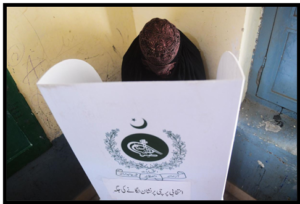A CHANCE TO STOP THE LAUNDRY CYCLE OF PAKISTAN’S ELECTIONS
Syllabus:
GS 2:
- Bilateral, regional and global groupings and agreements involving India and/or affecting India’s interests.
Focus:
- Qatar has released eight veterans of the Indian Navy who were sentenced to death on espionage charges.
Source:- The Hindu
The recent electoral outcome in Pakistan marks a pivotal juncture in its political narrative, offering a rare opportunity to break from the historical cycles of military influence and political instability. This analysis dissects the situation into detailed points under specified subheads, aiming to provide a comprehensive understanding of the complexities and potential paths forward.
Historical Patterns and Election Outcomes
- Persistent Political Cycles: Pakistan’s political landscape has been characterized by a recurring cycle of military-endorsed parties gaining power, followed by tension between the military and elected governments, leading to dismissals and fresh elections.
- Uncompleted Terms by Prime Ministers: No Prime Minister in Pakistan’s history has managed to complete a full term, reflecting the turbulent nature of its political environment.
- Military Influence Without Direct Control: Since 2008, the military has exerted its influence indirectly, ensuring its preferences are met through judicial interventions rather than overt coups.
- Judicial Role in Political Dynamics: The Supreme Court has played a critical role in shaping political outcomes, often through the dismissal of Prime Ministers under various pretexts, thereby maintaining a cyclic rotation of a limited political elite.
Recent Political Developments
- Imran Khan’s Political Journey: The Supreme Court’s intervention led to Imran Khan’s ousting through a no-confidence vote, followed by his conviction on charges ranging from corruption to un-Islamic conduct.
- Deregistration of PTI: Following judicial endorsement, the Election Commission derecognized Khan’s party, PTI, and stripped it of its symbol, impacting its electoral participation.
- Re-entry of Veteran Politicians: Legal reversals allowed Nawaz Sharif and Asif Ali Zardari, leaders with previous tenures as Prime Minister and President, respectively, to re-enter the political fray, indicating the cyclical nature of political leadership in Pakistan.
- Inter-Party Relations and Historical Incarcerations: The shared history of legal challenges and incarcerations among party leaders like Nawaz Sharif, Asif Ali Zardari, and Imran Khan suggests a pattern of political retribution and temporary exiles.
- Call for Unity: The editorial advocates for a unified stance among political leaders against military influence, emphasizing collaboration over conflict to foster stability and progress.
Election Commission and Results
- Slow Vote Counting: The counting of votes experienced unprecedented delays, leading to a gradual unveiling of results that indicated a three-way split without a clear majority.
- Formation of Government: The eventual coalition between PML-N and PPP, despite PTI’s significant independent seat wins, underscores the strategic alliances shaping government formation.
- Pressure on Independents: Newly elected independents faced immediate pressure to align with established parties, highlighting the manipulative tactics employed to secure governmental control.
Voter Sentiment and Participation
- Resilient Voter Turnout: Pakistani voters showcased their determination to influence political change, participating in the elections despite historical disenfranchisement and manipulation.
- Rejection of Pre-Established Outcomes: The voter’s choice reflected a clear rejection of the previously dominant PML-PPP governance, favoring change and challenging the status quo.
Economic Challenges and Reforms
- Compliance with IMF Mandates: The forthcoming government is tasked with implementing stringent reforms as dictated by the IMF, including significant budget cuts and structural adjustments in the economy.
- Impact of Economic Policies: The adoption of market-driven exchange rates and inflation control measures will test the resilience and popularity of the new government amidst economic hardships.
Lessons for Hybrid Democracies
- Voter Agency and Electoral Integrity: Pakistan’s electoral process underscores the importance of respecting voter decisions, demonstrating the challenges and potentials in hybrid democratic setups.
- Collective Action Against Authoritarianism: The need for democratically-minded leaders to unite in opposition to authoritarian tendencies is a crucial takeaway, emphasizing solidarity over division in the pursuit of democratic integrity.
| The implications of internal unrest in Pakistan carry significant repercussions for India’s national security
Regional Stability · Spillover Effects: Political and economic turmoil in Pakistan can lead to a destabilized regional environment, affecting neighboring countries, especially India. · Border Sensitivity: India’s long and complex border with Pakistan makes it particularly vulnerable to any form of instability in Pakistan, directly impacting India’s security posture. Security of Pakistan’s Nuclear Arsenal · Safety Concerns: The unrest and potential vulnerabilities within Pakistan’s military and security framework raise critical questions about the safeguarding of its nuclear weapons. · Risk of Nuclear Proliferation: There exists a tangible threat of extremist groups gaining access to nuclear materials, posing a dire risk to regional security, including India. Potential for Terrorist Exploitation · Extremist Haven: Pakistan’s ongoing challenges with terrorist organizations, like the Tehrik-e-Taliban Pakistan (TTP), present opportunities for these groups to capitalize on national chaos and instability. · Increased Terror Threats: Instability can embolden terrorist groups, potentially increasing the threat level across the border in India. Escalation of Cross-Border Tensions · Diversionary Tactics: Historical precedents show Pakistan might escalate tensions with India as a means to unify its population and divert attention from domestic troubles. · Risk of Confrontation: Such escalations can increase the likelihood of military confrontations, thereby destabilizing the region further. Impact on Counterterrorism Efforts · Weakening of Institutions: Domestic unrest could lead to the dilution of Pakistan’s counterterrorism capabilities, impacting broader regional counterterrorism initiatives. · Reduced Cooperation: Turmoil within Pakistan might also affect bilateral or multilateral efforts to combat terrorism, directly impacting India’s security strategy. Humanitarian and Refugee Concerns · Humanitarian Crisis: Political and economic instability in Pakistan could trigger a humanitarian crisis, with potential for a large-scale refugee influx into India. · Security Challenges: An influx of refugees could strain resources and infrastructure in border areas, complicating security operations and increasing the risk of infiltration by malicious elements. |
Source:
Mains Practice Question:
Analyze the role of the military in shaping the political landscape of Pakistan, especially in the context of the recent elections. Discuss how this influences the democratic process and governance in the country.




